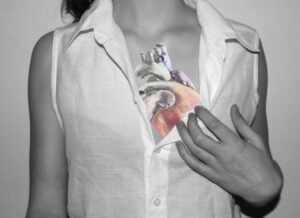Can Your Heart Think for Itself?

The relationship between the heart and brain has often been studied as a one way conversation, with the heart responding to the brain’s commands. Yet the idea of the heart as an intelligent, perceptual organ dates back to ancient times, and some say heart intelligence is more than metaphor. Based on their studies, researchers at the Institute of HeartMath propose that the heart and brain are in “a dynamic two-way dialogue, with each organ continuously influencing the other’s function.” Amazingly, the heart seems to be physically involved in processing intuitive information and communicating it to the brain. All this begs the question, can you really know something in your heart?
The IHM conducted a two part study on The Electrophysiological Evidence of Intuition to shed some light on the physical basis of emotional responses. Participants viewed a random sequence of calm or emotionally arousing images while their skin conductance and electrical activity of the brain (electroencephalogram) and heart (electrocardiogram) were recorded. They viewed pictures in two experimental conditions: normal psychophysiologic function and a physiologically coherent state in which heart rhythms, blood pressure and respiratory systems were held in a steady pattern for 15 minutes using HeartMath’s techniques.
The results indicate that “the body can respond to an emotional stimulus prior to experiencing the future stimulus.” In other words, the heart responds to emotional information before the brain can even perceive it. Amazingly, the beat-to-beat analysis suggests that the heart receives information normally outside the range of conscious awareness and communicates it to the brain and body through the nervous system, hormones, pulse rate and its own large electromagnetic field. A significant gender difference in the results indicates women are more attuned to intuitive information from the heart.
This and other studies underscore the idea that intuition is a system-wide process involving multiple organs and even extending outside the body in the form of electrical energy. According to IHM, the heart generates the largest field of electromagnetic energy in the body, enveloping every cell and extending out around us, possibly to collect information to relay inward. With a better understanding of where philosophy and physiology intersect, perhaps we can moderate this flow of information. If we can think our ways into and out of stress, maybe we can feel our way into a state of coherence with ourselves and others.
Follow Erin on Twitter: @ErinPie
image: Charlotte Astrid

